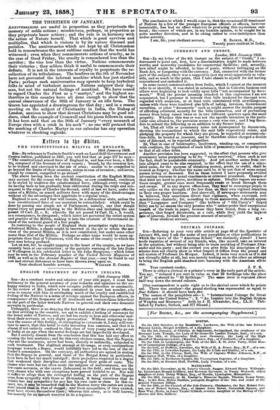CURRENCY AND CREDIT.
_London, 20th January 1858.
Snr—In my letter of the 4th instant on the subject of "Credit" I en- deavoured to point out, first, how a discrimination might be made between, worthy and unworthy candidates for commercial facilities ; and, secondly, how relief might be afforded, in time of panic, without infringing on the Bank Act, or tampering with the currency. But, connected with the former part of the subject, there was a suggestion (not my own) apparently so valu- able, and so much to the point, that I take shame to myself for not having remembered and embodied it.
In some recent communication from India, which I cannot at the moment refer to or identify, it was stated in substance, that in Calcutta bankera and others were beginning to look coldly upon bills "not accompanied by docu- ments." • With the precise meaning attached to this expression I am not acquainted, but I presume it intends that bills tendered for discount were regarded with suspicion, or at least were entertained with unwillingness, unless with them were tendered also bills of lading, invoices, Government securities, or other " documents " such as might answer the double purpose of affording collateral security for the bills themselves, and of preventing money from being raised twice or in two different quarters upon the same property. Whether this was or was not the specific intention in the parti- cular case alluded to, the provision seems a very wise one ; and I beg there- fore to submit the following as an addition to my former letter.
1st, That all bills or promissory notes not accompanied by documents, showing the transactions to which the said bills respectively relate, and pledging the property for which they are given, he regarded as accommoda- tion-bills, be treated as insecure, and be therefore either charged a double rate of discount, or be rejected altogether. 2d, That in case of bankruptcy, insolvency, winding-up, or composition with creditors, the liquidation of such bills or presuriesory notes be postponed to that of all other debts.
Another provision has been suggested, to theeffeet that persons who give promissory notes purporting to be for "value received," when such is not the fact, shall be punishable criminally. And yet another seems from cer- tain alleged cases to be also required, to the effect that the use of a simu- lated name, for the purpose of obtaining money, goods, or credit, shall be treated as forgery, whether the name used be or be not that of some actual person living or deceased. But in thee letters I have purposely avoided advocating recourse to penal enactments or criminal procedure. Charges of that kind are hard to prove, invidious Is enlarge. Smaller rogues are some- times caught, greater ones more frequently evade or break through them and escape. If in any degree efficacious, firm fiend to encourage people to rely rather on the strength of the law than 044*,tbeir own vigilant attention to their own proper business. And above all, if newspaper statements may be believed, they sometimes divert that vigilance, when exercised, into mischievous channels ; for, according to those statements, it should appear that " Longpaper and Company" (the holders of "Old Curry's" forged tills) are by no means the only persons who " ratherprefer that exceptional brawoh of the trade in paper, because they have found, from a long ex- perience, that forged documents, as a rule, while they yield the highest egte of interest, furnish the greatest amount of security.,'
Your obedient servant, H.*


































 Previous page
Previous page